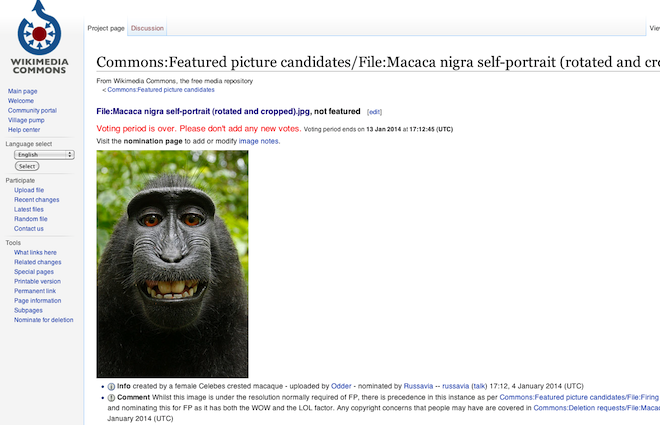Wikimedia: Camera-Owner Doesn’t Hold Copyright To Monkey Selfie

The image uploaded to Wikimedia Commons was taken by a macaque monkey who had briefly snatched away a professional photographer’s camera.
The photo in question is from a 2011 trip to Indonesia by nature photographer David Slater. While attempting to snap some photos of macaque monkeys, one snatched a camera from Slater and took some photos herself. Most were useless, but some were quite good, including a self-portrait of the grinning female macaque.
The story garnered some media attention a few years back, and the monkey’s self-portrait has been added to the Wikimedia Commons collection of 22 million images and videos that are free to use.
Slater has complained to Wikimedia and called for the removal of the image, but editors who vote on such matters have been split on whether or not he holds the copyright.
“This file is in the public domain, because as the work of a non-human animal, it has no human author in whom copyright is vested,” reads the current comment attached to the photo.
“Some of their editors think it should be put back up,” Slater tells the U.K.’s Telegraph. “I’ve told them it’s not public domain, they’ve got no right to say that it’s public domain. A monkey pressed the button, but I did all the setting up.”
The photography claims he put in all the cost and effort and that giving away this photo for free is damaging to him.
“For every 10,000 images I take, one makes money that keeps me going,” he explains. “And that was one of those images. It was like a year of work, really.”
A newly released Wikimedia transparency report explains that it disagrees with Slater that he owns the copyright, and since U.S. copyright law prohibits “non-human authors” from having copyright, no one holds the copyright and the image is in the public domain.
“To claim copyright, the photographer would have had to make substantial contributions to the final image, and even then, they’d only have copyright for those alterations, not the underlying image,” explains Wikimedia. “This means that there was no one on whom to bestow copyright, so the image falls into the public domain.”
Want more consumer news? Visit our parent organization, Consumer Reports, for the latest on scams, recalls, and other consumer issues.

